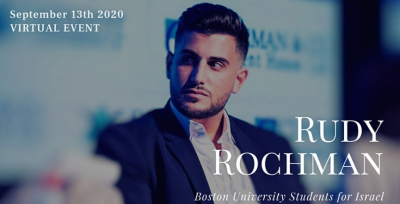At the age of seven, activist Rudy Rochman had a sudden reckoning with his identity when his mother was thrown off a bus in London for being Jewish. For him, this incident served as a call to action.

Rochman vowed that no matter where he went, he would always be a Jew and stand up for the Jewish community.
“In that moment, I felt really powerless,” Rochman said in an interview. “That moment made me promise, out of the guilt that I felt afterwards, that the next time I would see something like this … that I’d be ready for that.”
Rochman is no stranger to tackling tough conversations online. While the Jewish-Israeli commentator usually posts his perspectives on platforms such as Youtube and Facebook, he expanded to Zoom for a virtual event Sunday with on-campus organization Boston University Students for Israel.
BUSI hosted a webinar where Rochman addressed Jewish identity, Israeli activism and antisemitism, and offered ways to transcend the Israeli-Palestinian conflict.
Shelli Gorokhovsky, president of BUSI and a junior in the College of Arts and Sciences, wrote in an email she thought Rochman’s methods of conversation and personal narrative offer unique insights to students.
“I thought that Rudy Rochman’s approach to opening direct dialogue between people with different beliefs and from different sides is one that we can learn from,” Gorokhovsky wrote. “We wanted to invite him to share his own story.”
Rochman began the webinar by talking about his struggles with identity, something he says most Jews grapple with. He was born in Paris to a Sephardic Jewish mother of Moroccan descent and an Ashkenazi Jewish father of Polish descent, and had spent much of his life in the United States.
Rochman had enrolled in UCLA after serving as a combat soldier in Israel, but later transferred to Columbia University because it had been named the most antisemitic university in North America.
“I kept hearing [my friends] say, ‘Oh, well, I don’t want to go to this school because it’s too antisemitic,’” Rochamn said during the talk. “And I was like, ‘That’s exactly where we should be going to. If we’re not going there, who’s going to go there? Who’s going to change the story for us? Who’s going to be able to tell the truth if we ourselves don’t go there?’”
Rochman said his exposure to anti-Israel sentiments increased in college, adding that student groups — such as Boycott, Divestment, Sanctions; National Students for Justice in Palestine and Jewish Voice for Peace — focuses on Palestinian suffering at the hands of Israel alone, not other world powers. This, he said, does not push students to be pro-Palestine, but rather anti-Israel.
In response, Rochman heightened his role as a Jewish-Israeli activist, founding Columbia’s Students Supporting Israel chapter and serving as president. During Sunday’s discussion, he said his main goal with SSI was to educate and change the narrative on college campuses surrounding Jews.
“Our goal on campus was … to educate the community at large, on who the Jewish people are, what our story is, what our history is, what our identity is, what is the truth when it comes to Israel,” Rochman said. “Our model was basically: empower, educate and expose.”
Currently, Rochman serves on the board of directors for the Israel Innovation Fund and as a leader for HaBayit, an organization which furthers movements of centrist Israeli-Palestininan politics.
Rochman said in an interview that he hopes these young, predominantly grassroots organizations will help promote messages of unity and understanding in Israel and Palestine, ultimately working toward a resolution to the conflict.
“The solution, I think, will start from the generation that exists today that is living in this world, on both sides, realizing that there’s no future without the other,” Rochman said, “and focusing, instead of their efforts of fighting the other, how do we build the reality that allows us to end the suffering that we experience?”
CAS junior Hana Kraus, vice president of BUSI, wrote in an email after the event that Rochman represented the club’s mission and belief. She wrote the complexity of Israel-related issues is one that can only be solved with multiple perspectives and backgrounds.
“Israel is a very diverse country and I believe our members reflect that,” Kraus wrote. “We can discuss the history, but to truly make a difference, we have to think about the future and what is happening now, and how we can make it liveable, sustainable, peaceful and dignified for everyone, and can only do that together.”

















































































































Caitriona Lawlor • Sep 16, 2020 at 2:53 pm
Well done Isabel on this fantastic read.
Clayton Miller • Sep 16, 2020 at 2:08 am
Impressive young man.